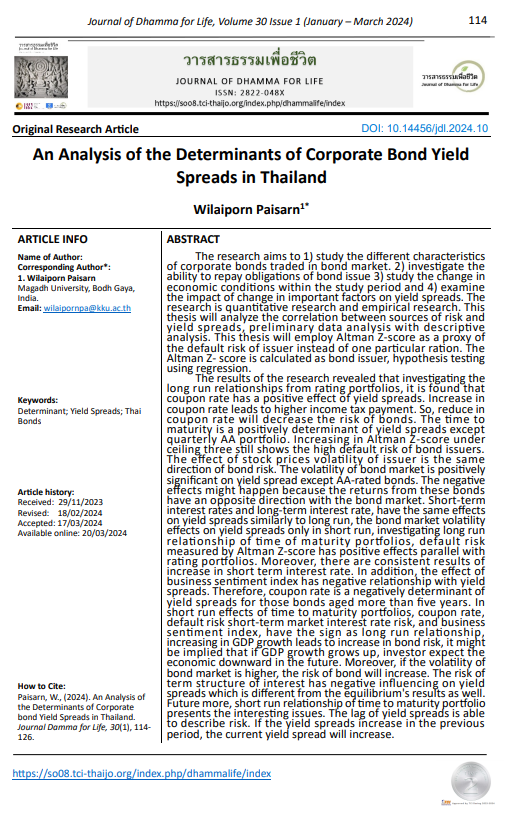An Analysis of the Determinants of Corporate Bond Yield Spreads in Thailand
Main Article Content
Abstract
The research aims to 1) study the different characteristics of corporate bonds traded in bond market. 2) investigate the ability to repay obligations of bond issue 3) study the change in economic conditions within the study period and 4) examine the impact of change in important factors on yield spreads. The research is quantitative research and empirical research. This thesis will analyze the correlation between sources of risk and yield spreads, preliminary data analysis with descriptive analysis. This thesis will employ Altman Z-score as a proxy of the default risk of issuer instead of one particular ration. The Altman Z- score is calculated as bond issuer, hypothesis testing using regression.
The results of the research revealed that investigating the long run relationships from rating portfolios, it is found that coupon rate has a positive effect of yield spreads. Increase in coupon rate leads to higher income tax payment. So, reduce in coupon rate will decrease the risk of bonds. The time to maturity is a positively determinant of yield spreads except quarterly AA portfolio. Increasing in Altman Z-score under ceiling three still shows the high default risk of bond issuers. The effect of stock prices volatility of issuer is the same direction of bond risk. The volatility of bond market is positively significant on yield spread except AA-rated bonds. The negative effects might happen because the returns from these bonds have an opposite direction with the bond market. Short-term interest rates and long-term interest rate, have the same effects on yield spreads similarly to long run, the bond market volatility effects on yield spreads only in short run, investigating long run relationship of time of maturity portfolios, default risk measured by Altman Z-score has positive effects parallel with rating portfolios. Moreover, there are consistent results of increase in short term interest rate. In addition, the effect of business sentiment index has negative relationship with yield spreads. Therefore, coupon rate is a negatively determinant of yield spreads for those bonds aged more than five years. In short run effects of time to maturity portfolios, coupon rate, default risk short-term market interest rate risk, and business sentiment index, have the sign as long run relationship, increasing in GDP growth leads to increase in bond risk, it might be implied that if GDP growth grows up, investor expect the economic downward in the future. Moreover, if the volatility of bond market is higher, the risk of bond will increase. The risk of term structure of interest has negative influencing on yield spreads which is different from the equilibrium's results as well. Future more, short run relationship of time to maturity portfolio presents the interesting issues. The lag of yield spreads is able to describe risk. If the yield spreads increase in the previous period, the current yield spread will increase.


